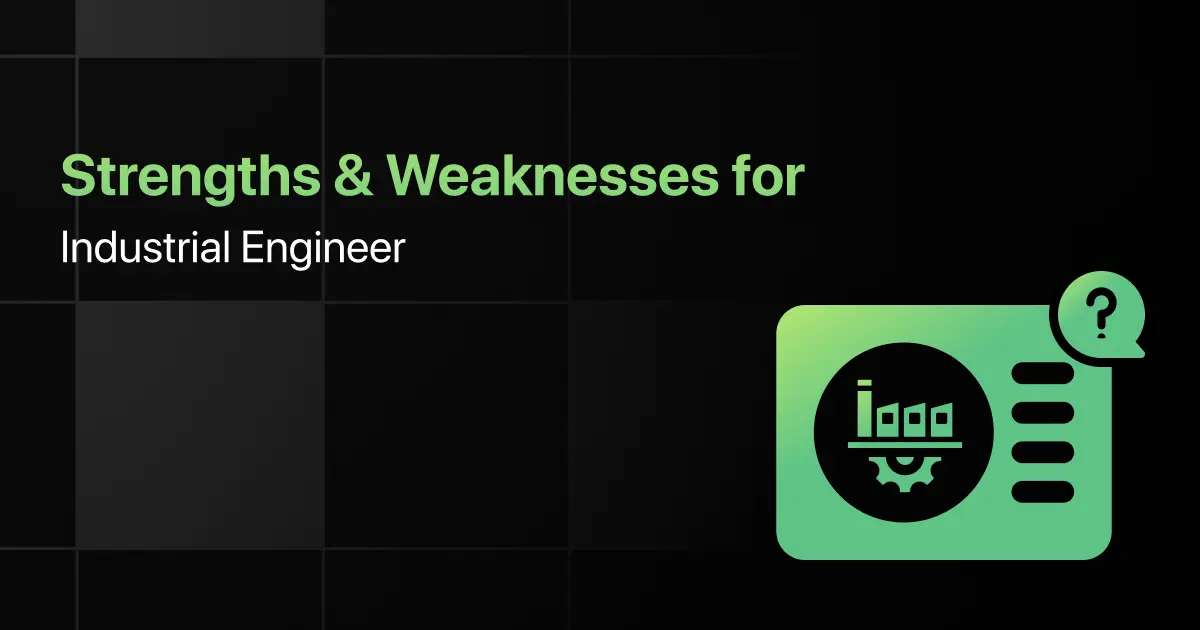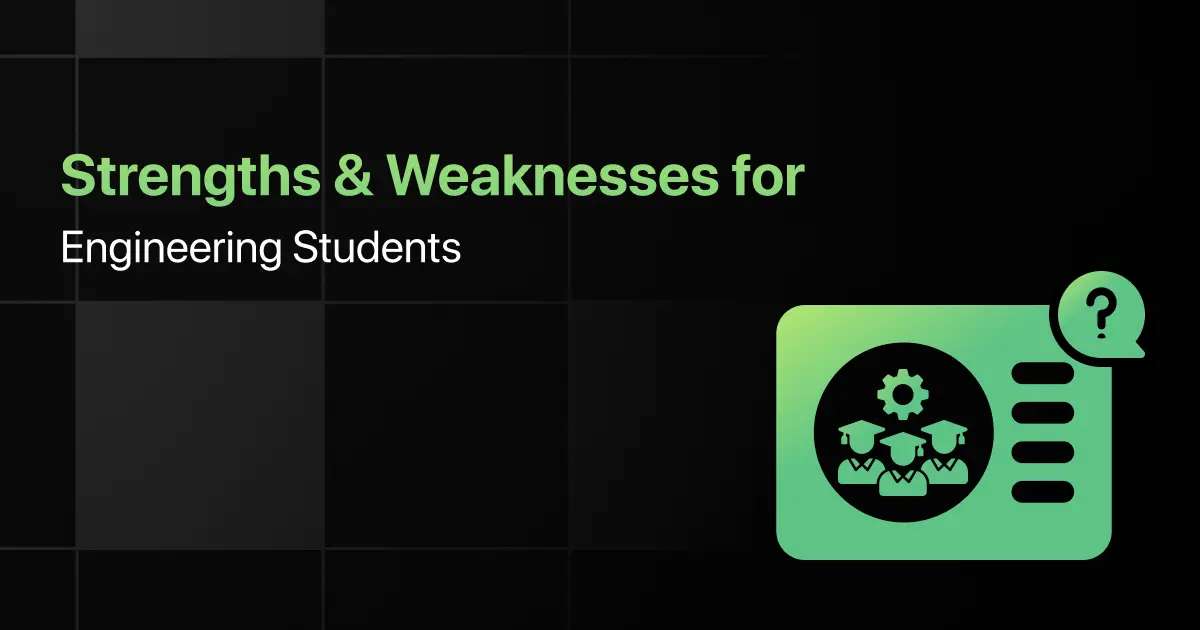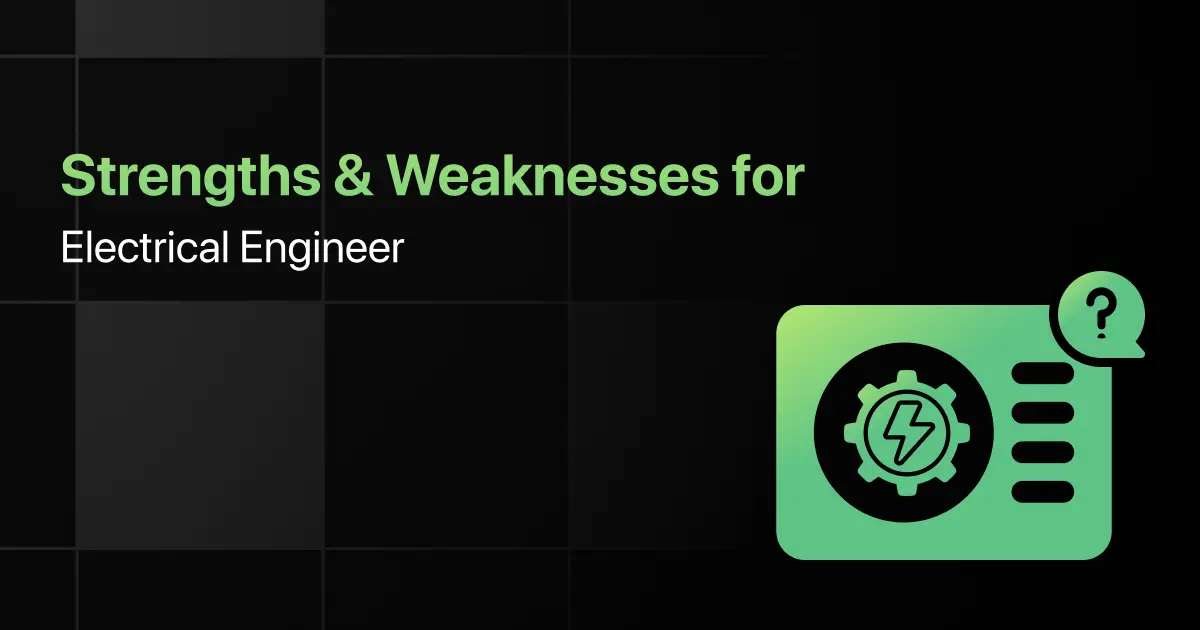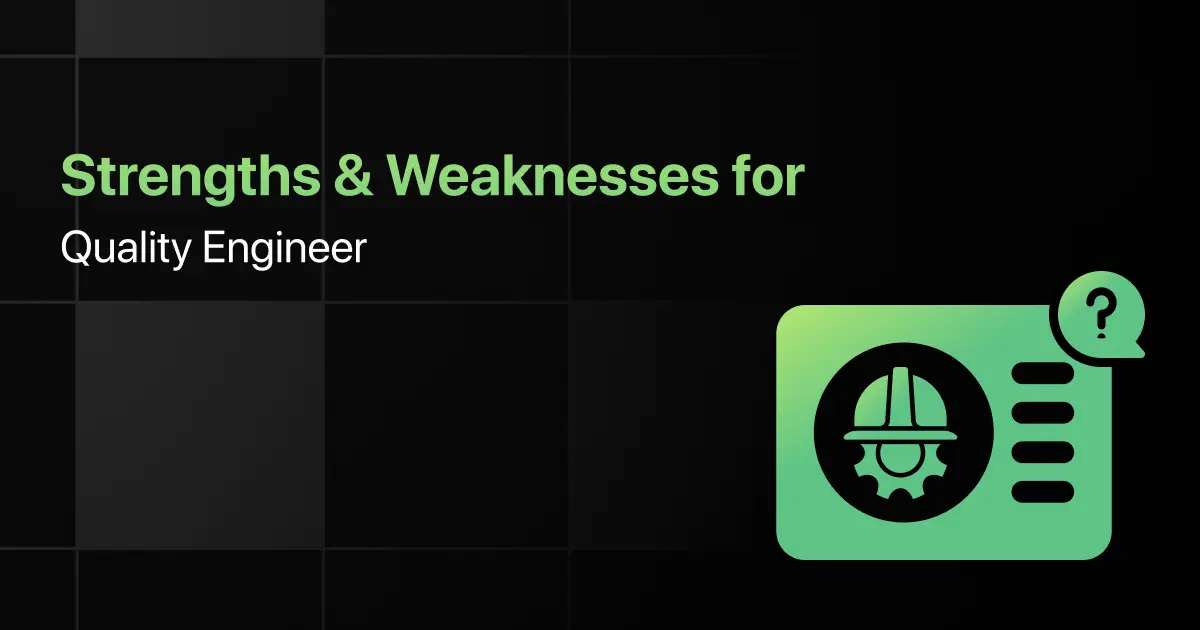Strengths & Weaknesses for Industrial Engineer Freshers

In job interviews, industrial engineers need to showcase their ability to improve processes, manage resources, and solve problems efficiently.
However, one of the biggest challenges is explaining their strengths and weaknesses in a way that impresses employers.
This blog will help with strengths & weaknesses for industrial engineers.
Strengths for Industrial Engineer Interviews
Below are the 3 strengths for industrial engineers for interviews:
1. Process Optimization & Lean Manufacturing
Process optimization and Lean Manufacturing are key to making operations more efficient, reducing waste, and improving productivity.
Industrial engineers use methods like Value Stream Mapping, Kaizen, and the 5S System to streamline workflows and cut unnecessary steps.
This results in cost savings, faster production times, and better resource utilization.
Template Version:
“At [Your Previous Company], I led a Lean Manufacturing project to optimize [specific process, e.g., ‘assembly line workflow’].
By applying [specific technique, e.g., ‘Kaizen and 5S’], we reduced waste by [specific result, e.g., ‘30%’] and improved production speed.”
Logic Behind This:
This version is effective because it connects Lean Manufacturing to a real impact, showing improvements in waste reduction.
Mistakes to Avoid:
Don’t just say “I improve processes”—explain how you optimize them.
Avoid vague terms like “I know Lean” without showing how you applied it.
Don’t forget to mention the actual results of your optimization efforts.
2. Supply Chain & Logistics Management
Industrial engineers play a crucial role in optimizing supply chain and logistics systems to reduce costs and improve delivery efficiency.
Understanding inventory management, supplier coordination, and distribution strategies ensures smooth operations.
Efficient supply chain management minimizes delays and keeps production running without bottlenecks.
Template Version:
“At [Your Previous Company], I optimized the supply chain for [specific product, e.g., ‘automobile parts distribution’], reducing lead times by [specific result, e.g., ‘25%’].
By implementing [specific strategy, e.g., ‘just-in-time inventory and better supplier coordination’], we cut costs and improved delivery reliability.”
Logic Behind This:
This version highlights a real-world application of supply chain improvements.
Mistakes to Avoid:
Don’t just say “I manage supply chains”—explain how you improved them.
Avoid generic terms like “I reduced costs” without specific numbers.
Don’t forget to mention the key strategies or tools you used.
3. Data-Driven Decision Making
Industrial engineers rely on data to drive efficiency, solve problems, and make informed decisions.
Using statistical analysis, predictive modeling, and data visualization tools like Power BI or Python, they can identify inefficiencies and improve processes.
Data-backed decisions help reduce errors and increase productivity.
Template Version:
“At [Your Previous Company], I used data analytics to improve [specific process, e.g., ‘production scheduling’].
By analyzing [specific metric, e.g., ‘historical production data’], I developed a model that reduced downtime by [specific result, e.g., ‘20%’]”
Logic Behind This:
This version clearly shows how data analysis leads to actionable insights and improved efficiency..
Mistakes to Avoid:
Don’t just say “I use data”—explain how data helped improve operations.
Avoid mentioning tools without stating how they were used.
Don’t forget to highlight measurable improvements from your data-driven approach.
Weaknesses for Industrial Engineer Interviews
Below are the 3 weaknesses for industrial engineers for interviews:
1. Limited Experience with Automation & AI
Automation tools like PLCs, robotics, and AI-driven process optimization are becoming more common in industrial engineering.
Without hands-on experience, an engineer might struggle to implement efficiency improvements and keep up with industry trends.
Template Version:
“In my previous roles, I focused more on process optimization and had limited hands-on experience with automation tools like [specific tool, e.g., ‘Siemens PLCs’ or ‘SCADA systems’].
To improve, I have been taking online courses and working on small projects to gain practical knowledge.”
Logic Behind This:
This answer works well because it acknowledges the gap but also highlights a clear plan for improvement.
Mistakes to Avoid:
Don’t say automation tools aren’t important—efficiency is key in industrial engineering.
Avoid making it sound like you’re completely unfamiliar with automation—mention what you are learning.
Don’t leave out your efforts to improve; always show you are taking action.
2. Challenges in Workforce Change Implementation
Industrial engineers work with different teams, including production, quality control, and management.
If communication is unclear, it can lead to misunderstandings, delays, and inefficiencies.
Template Version:
“I have sometimes found it challenging to communicate technical process improvements to non-engineering teams in a way that is clear and actionable.
To improve, I have been practicing simplifying technical explanations and using visual tools like flowcharts and reports to bridge the gap.”
Logic Behind This:
This answer is effective because it reassures the employer that you recognize the importance of clear communication and are working on it.
Mistakes to Avoid:
Don’t blame other departments for communication issues—take responsibility for improving clarity.
Avoid technical jargon when explaining this weakness—keep it simple.
Don’t act like communication isn’t a priority—it’s important for teamwork and project success.
3. Over-Reliance on Theoretical Models
Compliance with safety and quality regulations is critical, but too much focus on rules can sometimes make it harder to introduce new ideas.
Engineers need to balance compliance with innovation.
Template Version:
“I have always prioritized compliance to ensure processes meet industry standards. However, I’ve realized that being too strict with regulations can sometimes slow down innovation.
To improve, I am learning how to balance compliance with problem-solving, ensuring both safety and efficiency.”
Logic Behind This:
This response works well because it acknowledges the challenge while showing awareness of the need for balance.
Mistakes to Avoid:
Don’t suggest that compliance isn’t important—it’s critical in industrial engineering.
Avoid saying you resist innovation—show that you’re working on finding a balance.
Don’t just mention the weakness—always explain how you’re improving.
Final Words
In the end, knowing how to talk about your strengths and weaknesses can help you perform better in an industrial engineering interview.
By clearly explaining your skills and showing a willingness to grow, you prove that you’re ready to take on challenges.
Frequently Asked Questions
1. What key strengths should a industrial engineer mention during an interview?
Industrial engineers should focus on their problem-solving skills, ability to optimize processes, strong analytical thinking, and experience with Lean and Six Sigma.
2. What are the most common weaknesses of industrial engineers?
Some common weaknesses include difficulties with managing large-scale projects, challenges in communicating with non-technical teams, and occasionally lacking hands-on experience with tools or systems.
3. How can industrial engineering freshers identify their strengths and weaknesses?
Freshers can get a good sense of their strengths and weaknesses by looking at feedback from past projects or internships, and asking mentors for constructive criticism.
4. How can industrial engineers frame their weaknesses in a positive way during interviews?
Quality engineers can frame their weaknesses in a positive way by focusing on those they are actively improving and demonstrating their willingness to learn, adapt, and grow.
5. What technical skills should industrial engineers emphasize in job interviews?
In interviews, industrial engineers should highlight their skills in process improvement, data analysis, and simulation software like Arena or Simul8.It’s also important to mention any experience with Lean and Six Sigma, operations research, and familiarity with tools like Excel and AutoCAD.
Related Posts

Strengths & Weaknesses for Engineering Students Freshers
For engineering students, job interviews can feel challenging because they are just starting their careers. One of the toughest parts is …






